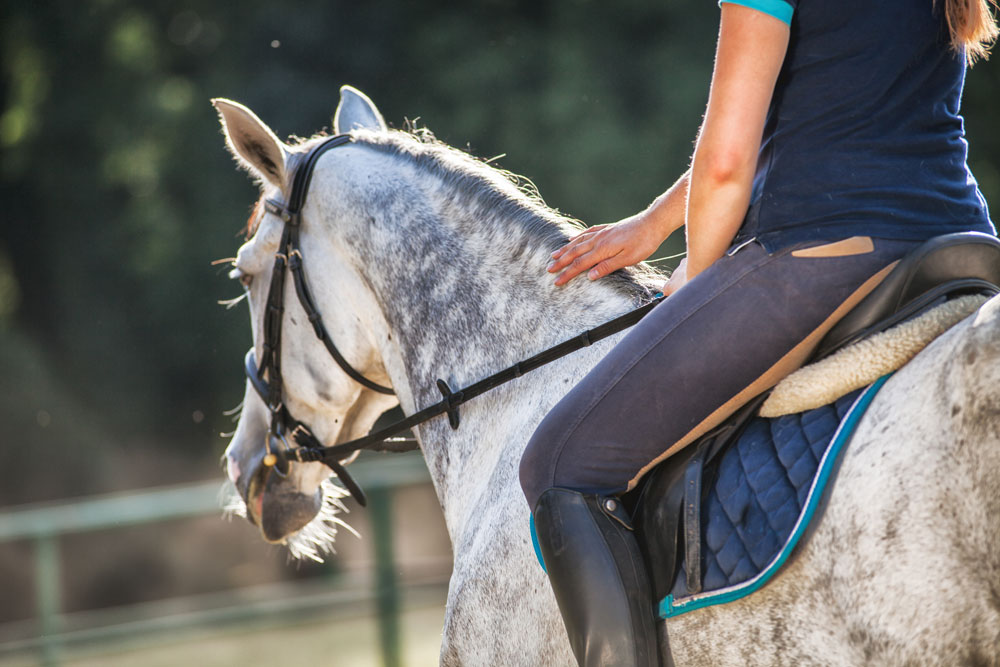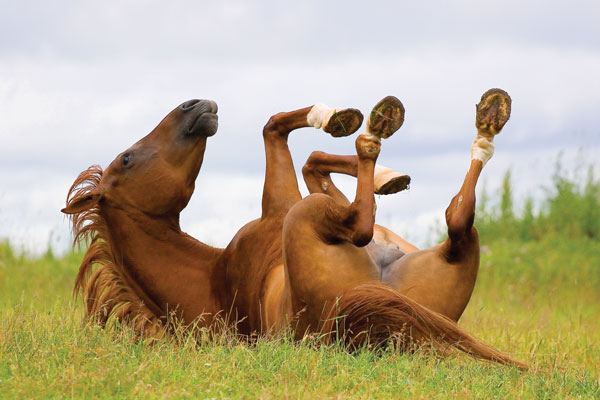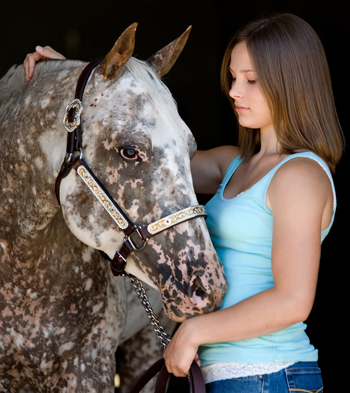
Photo: Leszek Glasner/shutterstock
Did you know that horses can become dehydrated or get sunburn in hot weather—just like you! If you live in an area that heats up in the summer, you should protect your horse from hot-weather hazards. Here are 20 things you can do to keep your favorite horse or pony healthy and happy in warm weather.
- Make sure she gets enough fresh, clean water every day. Your horse must have a constant source of water in her pasture. A horse may drink more than 10 gallons of water a day. If she doesn’t get enough water, she could get dehydrated and become sick.Check the water trough every day and fill it if it’s low. If the pasture has an automatic waterer, check it once a day to make sure it’s working.Clean out troughs if they fill with algae and turn green.
- Keep a tube of SPF 30-plus sunscreen in the barn and put it on both you and your horse! Horses with white markings on their faces may get sunburn, so you may have to apply sunscreen on a daily basis.If a horse’s face gets burned, you’ll notice red patches and peeling skin. These patches can turn into sores that could get infected if you don’t treat them quickly.If a horse suffers from severe sunburn, you may have to put a fly mask on her that offers UV protection or keep her in the barn in during daylight hours. You can buy a long mask that covers her nose too.
- Hosing off your horse with water at the end of the day removes the sweat that attracts flies. Plus your horse will find her daily shower refreshing!
- If flies bother your horse, turn her out wearing a fly sheet. This lightweight mesh sheet keeps the flies away from her sensitive areas and it helps prevent her coat from fading in the bright sun.
- If you use a fly mask on your horse, check underneath it every day to make sure your horse hasn’t injured her face or eyes. Keep the mask clean as well. If it gets muddy, hose it off.
- Deworm your horse regularly. Worms thrive in rainy, hot weather conditions. Make sure you work with your vet to create a parasite control plan to keep dangerous parasites out of your horse’s delicate digestive system.
- If you see your horse in the mornings, apply fly repellent to her coat to help keep flies at bay during the day. Some horses are bothered by gnats or midges on their bellies in the summer, so spread a gooey medicine or fly repellent on her tummy every morning.
If you can’t spray her every day, consider applying a spot-on treatment that repels flies for around 14 days. - If you spot buckets with dirty water in them dump them out. If you have old tires that collect water in them toss them out. Fix leaky faucets. Standing water makes ideal breeding areas for mosquitoes and these pests can give your horse a disease called the West Nile Virus.
- Scrub out water buckets regularly because they can get slimy from algae.
- If you keep your horse inside during the day, buy a fan to hang in her stall. A fan helps keep her cool and it moves air around which cuts down on the flies and mosquitoes that bother your horse. Ask a horsey adult to show you how to hang up the fan safely. Make sure your horse can’t chew on the electrical cord.
- When you ride in hot weather, be aware of your horse’s behavior. If she starts heaving or sounds like she’s having trouble breathing, she may be overheated. Untack her immediately and hose her down with cool water. If she seems sick call your veterinarian.
Warm up your horse gradually in hot weather and walk her around for five or 10 minutes after each workout to cool her down. - Know how to spot when your horse is dehydrated. It’s easy—do a “pinch test.” Pinch your horse’s skin between your thumb and index finger and then let go. If the skin stays pinched for more than a second, she’s probably dehydrated and she needs to drink water right away. You should probably call the vet too because she may be sick.
- Always keep a salt block in your horse’s pasture so she can lick it when she likes. Salt is an essential mineral that a horse loses when she sweats. A horse may sweat a lot in the summer, especially when she’s ridden, so she must be able to lick a salt block whenever she wants. You can buy salt blocks at the feed store.
- If you work your horse hard in the summer, make sure she’s drinking enough water by adding electrolytes to her water or feed every day. Electrolytes are a mixture of minerals that make your horse thirsty so she’ll want to drink water. You can buy electrolytes at the feed store.
- Think twice about working your horse when it’s 95 degrees or above. Strenuous exercise in extreme heat can cause heat exhaustion for your horse—and for you. Schedule rides for early in the morning or in the evening when it’s cooled down a bit.
- Check your feed regularly, because sweet feed can get moldy in hot weather and you don’t want to feed it to your horse.
- Scrub out dirty feed buckets regularly because they will attract flies to the barn.
- If you can, provide some shade for your horse out in her field. If it’s really hot, turn her out in a field with a run in shelter or some trees to help keep her out of the sun. She’ll go in a turnout shelter to escape flies too.
- If you spread manure in the summer with a chain harrow, do it when the sun is shining brightly and it’s hot. Heat kills the parasites that live in manure piles. If you drag when it’s muggy and wet, the parasites can live on another day.
- Take advantage of warm, sunny weather and give your grooming brushes a good cleaning. Fill a bucket with warm water and some shampoo and throw in your brushes. Give them a swish around, and then rinse them off with the hose. Lastly, set them in the sun to dry.





